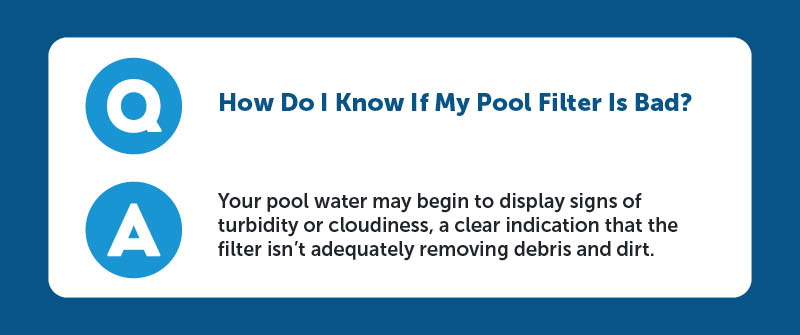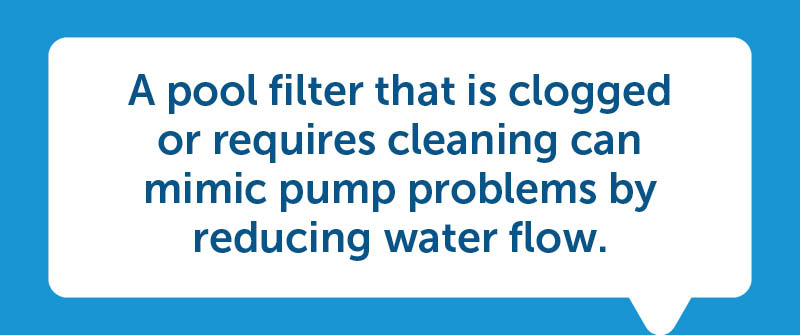How Often Should A Pool Filter Be Replaced?
The frequency of pool filter replacement largely depends on a variety of factors including the type of filter, how often the pool is used, and environmental conditions. Regular maintenance and understanding the signs of wear and tear can dramatically increase the lifespan of your pool filter, but eventually, the need to replace it becomes essential to maintain optimal pool cleanliness and filtration efficiency.
Factors Affecting Filter Lifespan
Several factors influence the longevity of a pool filter, including pool usage, the type of filter material, and the environmental conditions. For instance, inground pool filters typically last longer than above-ground models due to their robust construction. Frequent use and exposure to harsh environmental elements, common in regions like Florida, can also cause more rapid degradation, affecting the overall pool system.
Average Lifespan Of Different Filter Types Including Sand Filters
Typically, sand filters can serve between 5 and 7 years, cartridge filters last 2 to 3 years, and diatomaceous earth (DE) filters can last up to 10 years, though they require more frequent maintenance. Filter cartridges can become damaged over time and may have a use-by date. By understanding the specific lifespan of each type, including the advantages of cartridge filter elements, you can better anticipate when replacement might be necessary.
Intex Pool Filter Replacement Schedule
For those using an Intex pool filter, a careful watch is necessary as these filters may need to be replaced yearly, especially with high usage or suboptimal conditions. Checking manufacturer guidelines on replacement frequency can offer insights specific to your model.
Environmental Factors Influencing Filter Longevity In Florida
Florida’s warm climate and heavy rainfall can significantly influence pool filter longevity. With regular exposure to environmental factors like heat and humidity, filter media such as sand and glass can degrade more quickly. Regular inspections and maintenance can help mitigate these impacts, ensuring that the filter remains effective for as long as possible.
How Do I Know If My Pool Filter Is Bad?
Recognizing a bad pool filter is crucial for maintaining the cleanliness and safety of your swimming pool. A properly functioning pool filter is essential for removing dirt and impurities, and any issues such as cloudy or dirty water may indicate a filter malfunction, but how do I know if my pool filter is bad? There are several signs of a dysfunctional pool filter that homeowners should be aware of. Noticing these signs early can save you from more extensive issues and ensure your pool remains a healthy and enjoyable space.
Common Signs Of A Failing Pool Filter
Your pool water may begin to display signs of turbidity or cloudiness, a clear indication that the filter isn’t adequately removing debris and dirt. Another symptom is a persistent buildup of debris in the pool, even shortly after cleaning, suggesting your filter isn’t capturing particles efficiently. Additionally, checking the pressure gauge on your filter system can provide insights. A reading that is consistently higher or lower than normal suggests the filter may be clogged or not functioning correctly. Regular cleaning is essential to maintain the efficiency and longevity of your pool filter.

Performance Issues Indicating Replacement Need
If your pool filter is malfunctioning, you may find your pool requires more frequent cleaning and maintenance. Understanding how long pool filters last is crucial, as the pool’s circulation system may also struggle, with the pump working harder to push water through a clogged or failing filter, leading to possible pump damage. This inefficient system can significantly impact energy consumption and costs.
Impact On Water Clarity And Cleanliness
How do I know if my pool cartridge is bad? A poor-performing filter directly affects water clarity and cleanliness. Murky or discolored pool water can lead not only to aesthetic concerns but also to health risks due to increased contaminant levels. If you detect these issues, it might indicate a filter cartridge replacement is necessary.
Difference Between Filter And Pump Issues
It’s important to distinguish whether the problem originates from the filter or the pump. If you hear unusual noises or experience fluctuating water flow, the issue might lie with the pump. In contrast, ongoing issues with water cleanliness are more likely tied to filter efficiency. Regular checks of your pool equipment can help differentiate and diagnose the right component requiring attention.
How Long Does A Pool Filter Last?
Understanding the pool filter lifespan is crucial for planning maintenance and replacements, which ensures optimal pool performance and water quality. Different types of pool filters have varying lifespans, and this can be influenced by several factors, including the regional climate and maintenance practices. For instance, a cartridge filter is known for its efficiency and ease of maintenance, often requiring only rinsing and occasional soaking in cleaner.
Lifespan Of Inground Vs. Above-Ground Filters
The type of pool filter you have significantly impacts its longevity. Generally, inground pool filters are more robust and durable than those used in above-ground pools. They are often designed to handle larger capacities and may last up to 7-10 years with proper care. Above-ground pool filters might have a slightly shorter lifespan due to lighter construction, typically lasting 5-7 years.
Regional Differences, Like Florida Conditions
Climate and local conditions play a considerable role in how long a pool filter will last. For instance, in states like Florida, where pools are in frequent use due to the warm climate, filters are subjected to more wear and tear. The high humidity and frequent storms can also affect the durability of the filter’s materials. Therefore, a pool filter in Florida might require more frequent maintenance checks and might have a shorter effective lifespan compared to filters in cooler, less humid regions. Additionally, ensuring the sand bed is properly maintained is crucial for optimal filtration in such demanding conditions.
Estimating Longevity For Different Brands Like Hayward
When considering different brands, Hayward pool filters are known for their quality and durability, often surpassing decade-long usage with proper maintenance. However, it’s critical for pool owners to follow the manufacturer’s guidelines and perform regular checks to ensure any brand’s longevity remains optimal.
Maintenance And Usage Impact On Lifespan
Regular maintenance and appropriate usage greatly extend the lifespan of pool filters, especially in commercial swimming pools. Cleaning or replacing filter elements, ensuring proper water chemistry, and reducing debris entry can enhance filter longevity. Properly maintaining the filter housing and components can also prevent premature wear and failure.
How Do I Know If My Pool Pump Needs Replacing?
One of the key questions for any pool owner is how to determine if the pool pump needs replacing. A malfunctioning pump can lead to various issues, from inadequate water circulation to increased energy costs. Recognizing the signs early can save you both effort and money in maintaining your pool system.
Signs Indicating Pump Problems
Several symptoms commonly indicate pump trouble. Unusual noises, such as grinding or screeching, are often a clear sign. These can stem from motor issues or debris caught in the pump. Decreased water flow or noticeable drops in water pressure can also suggest pump malfunction. In some instances, leaks around the pump or frequent overheating might point to the need for a replacement. Regular maintenance of pool equipment, including timely replacements of filters, is crucial to prevent such issues and ensure efficient operation.
Diagnosing Filter Vs. Pump Issues
It’s crucial to differentiate whether the issue lies with the pump or the filter. A pool filter that is clogged or requires cleaning can mimic pump problems by reducing water flow. Start by checking the filter to ensure it’s not the source of the issue. If the filter is clean and issues persist, it’s more likely the pump that needs attention. Listening to the pump and inspecting for visible signs of wear can further help in diagnosis. Pool owners should regularly maintain their filters to prevent such issues and ensure the longevity of their pool systems.

Importance Of Regular Maintenance Checks
Proactive maintenance plays an essential role in extending the life of your pool’s pump. Regular checks and services help in catching potential problems before they become significant issues, thereby enhancing the longevity and performance of the pump. Simple tasks like ensuring the pump’s housing is clean and securely sealed can prevent many common issues. Additionally, regular cleaning of the pool filter is crucial for maintaining the efficiency and longevity of the entire system.
Economic Analysis: Repair Vs. Replacement
When considering the economics of repair vs. replacement, weigh the costs and benefits. Sometimes the repair might be cheaper temporarily, but frequent repairs can add up over time. Conversely, investing in a new, energy-efficient pump can reduce long-term operational costs and offer better performance. If your pump is an older model, a replacement may offer updated benefits, including energy efficiency and better design features. Additionally, recognizing the need to replace worn-out or ineffective filters is crucial for maintaining optimal performance and hygiene in your pool care.
At DiscountFilters.com, we help ease your decision-making process by providing high-quality products designed to meet your needs. Whether you are looking to replace your pump or maintain your filtration system, our diverse array of filters and components will ensure your pool stays in top condition. Trust us for affordability, quality, and exceptional service. Experience the benefits of seamless filtration with easy-to-use, compatible products that will transform your pool experience.

